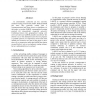Free Online Productivity Tools
i2Speak
i2Symbol
i2OCR
iTex2Img
iWeb2Print
iWeb2Shot
i2Type
iPdf2Split
iPdf2Merge
i2Bopomofo
i2Arabic
i2Style
i2Image
i2PDF
iLatex2Rtf
Sci2ools
132
click to vote
AINA
2008
IEEE
2008
IEEE
Geographical Routing in Intermittently Connected Ad Hoc Networks
In intermittently connected ad hoc networks standard routing protocols like AODV, DSR and GPSR fail since they generally cannot find a contemporaneous path from source to destination. In this paper we present LAROD, a geographical routing protocol for intermittently connected networks. Combining beacon less geographical routing with store-carry-forward LAROD greedily searches for the shortest way to the destination and when no progress is possible packets are temporarily stored until node mobility has created a new path. In the paper we have shown by a comparative study that LAROD has almost as good delivery rate as an epidemic routing scheme, but at a substantially lower overhead.
AINA 2008 | Computer Networks | Geographical Routing | Geographical Routing Protocol | Routing Protocol |
Related Content
| Added | 29 May 2010 |
| Updated | 29 May 2010 |
| Type | Conference |
| Year | 2008 |
| Where | AINA |
| Authors | Erik Kuiper, Simin Nadjm-Tehrani |
Comments (0)

